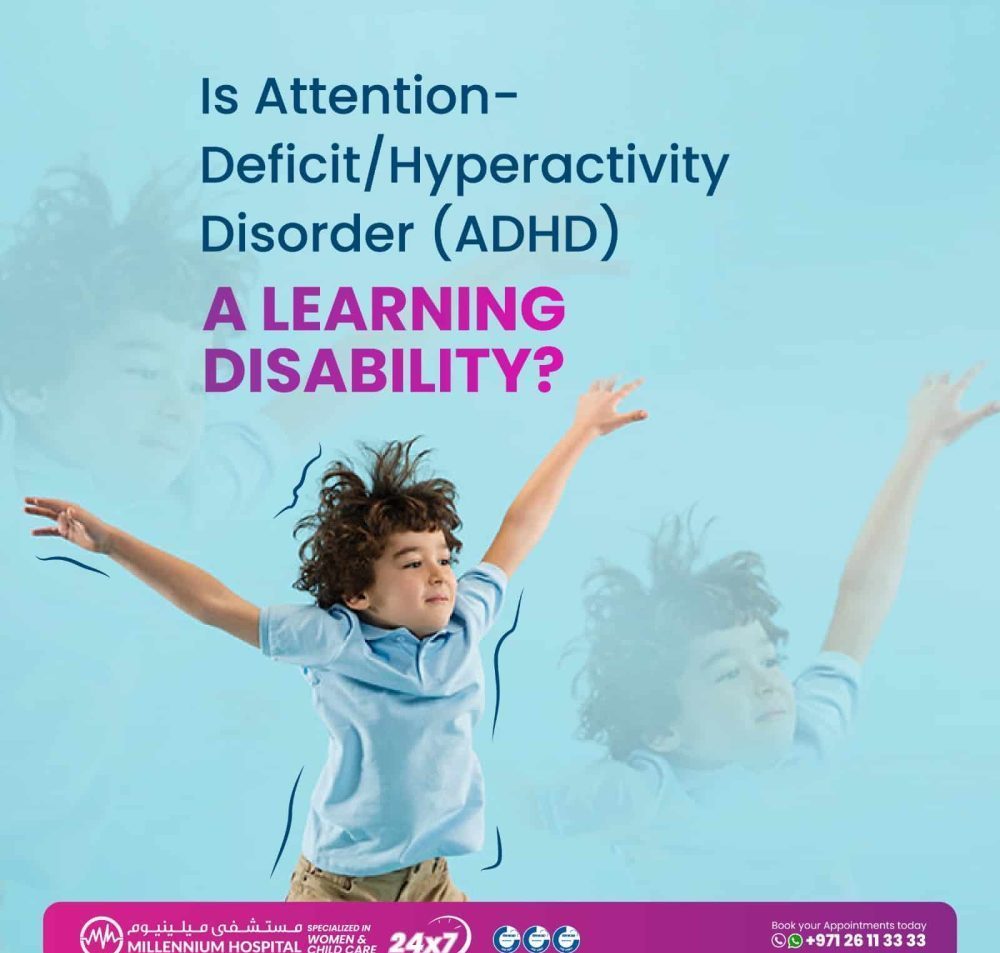
ADHD stands for Attention-Deficit/Hyperactivity Disorder. It is a neurodevelopmental disorder that affects both children and adults (ADD- Attention Deficit Disorder). ADHD is characterized by persistent inattention, impulsivity, and hyperactivity patterns that interfere with daily functioning and development. ADHD is not considered a learning disability, but research proves that 50% of children with ADHD are facing issues with learning.
Types of ADHD
There are three types of ADHD recognized by the Diagnostic and Statistical Manual of Mental Disorders (DSM-5):
• Predominantly Inattentive Presentation (ADHD-PI): Individuals with this type primarily struggle with inattention. They have difficulty sustaining attention, organizing tasks, and following instructions, and may appear forgetful or easily distracted.
• Predominantly Hyperactive-Impulsive Presentation (ADHD-HI): This type is characterized by hyperactivity and impulsivity. Individuals with ADHD-HI may have trouble staying still, engage in impulsive behaviors, interrupt others, and struggle with patience.
• Combined Presentation (ADHD-C): This type includes inattention and hyperactivity/impulsivity symptoms. It is the most common type of ADHD.
Symptoms
The symptoms of ADHD vary but generally include:
o Inattention: Difficulty paying attention to details, easily distracted, difficulty following instructions or completing tasks.
o Hyperactivity: Restlessness, constant fidgeting, difficulty staying seated, excessive talking, difficulty engaging in quiet activities.
o Impulsivity: Acting without thinking, interrupting others, difficulty waiting for turns, impatience.
How to take care of ADHD?
o Education and awareness: Learning about ADHD helps individuals, their families, and caregivers understand the condition better, manage symptoms, and seek appropriate support.
o Structured environment: Establishing routines, creating clear rules and expectations, and maintaining an organized environment can help individuals with ADHD stay focused and manage their tasks.
o Behavioral interventions: Implementing behavior management techniques such as positive reinforcement, goal setting, and time management strategies can assist in improving self-control and reducing impulsive behavior.
o Medication: Some individuals may benefit from medication prescribed by healthcare professionals. Commonly used medications for ADHD include stimulants (e.g., methylphenidate) and non-stimulants (e.g., atomoxetine).
o Psych education and counseling: Individual or family counseling can provide support, guidance, and coping strategies for managing ADHD-related challenges.
o Supportive interventions: Support groups, coaching, and accommodations at school or work can help individuals with ADHD thrive and navigate their daily lives effectively.
How can parents play a crucial role?
Children themselves cannot overcome ADHD, parents can play a crucial role in supporting and managing ADHD too.
o Education and understanding: parents should learn about ADHD and must have a clear-cut image of ADHD, its symptoms, and its impact on a child’s life. This knowledge will help you develop empathy, patience, and effective strategies.
o Establish routines and structure: Create a consistent daily schedule with clear expectations and predictable routines. It helps children with ADHD understand what to expect and provides a sense of stability.
o Clear communication: Use clear/simple and concise instructions when communicating with your child. Break work into smaller steps and provide reminders. Ensure that your child understands what is expected from them.
o Positive Boosting: Praise and reward your child’s positive behaviors and accomplishments. Reinforcement can motivate your child and increase their self-esteem. Focus on their strengths and provide specific feedback.
o Use visual aids and reminders: Visualizing tasks, like charts, calendars, or checklists, can help your child stay organized and remember tasks. Display these reminders at the spot where their eyes approach.
o Provide a supportive environment: Create a calm and structured space for your child to study, complete tasks, and relax. Minimize distractions and clutter that can hinder their focus.
o Break tasks into manageable chunks: Large tasks can be overwhelming for children with ADHD. Break them down into smaller, more manageable steps. Offer guidance and support as they complete each step.
o Encourage physical activity: Regular exercise and physical activities can help to get excess energy and improve their focus. Encourage your child to participate in sports, outdoor play, or other activities they enjoy.
o Effective discipline: Use consistent and fair discipline strategies. Set clear rules and after-effects of behaviors. Focus on teaching and understanding behaviors rather than punishing them.
o Collaborate with teachers and professionals: Maintain open communication with your child’s teachers and seek their support. Work together to develop strategies that can be implemented both at home and at school.
o Seek support for yourself: Parenting a child with ADHD can be challenging and overwhelming at times. Seek support from support groups, counseling, or parenting classes. Taking care of yourself will enable you to better support your child.
The exact causes of ADHD are not fully understood, but the studies show that it is likely a combination of genetic, environmental, and neurological factors. It is believed that imbalances in certain neurotransmitters (chemical messengers in the brain) and differences in brain structure and functioning can contribute to ADHD.
Always we need to keep in mind that same as adults every child with ADHD is unique, and what works for one may not work for another. It’s important to tailor strategies to each child’s specific needs and consult professionals, such as psychiatrists, psychologists, or Pediatricians, for a comprehensive evaluation and personalized treatment plan. They can provide accurate diagnosis, guidance, and appropriate interventions based on the individual’s specific needs.